A sleep app is a smartphone application that creates a relaxing atmosphere so you can get to sleep.
Most sleep apps fall into one of three general categories: those that employ ambient sound, those that employ ambient music, or those that embrace the tried and true method of the bedtime story.
Whether your restlessness is the result of stress, illness, shift work, or age, there is an app that can help you get to sleep in a timely fashion. Below is our updated list of the best sleep apps of 2023.
Rankings
1. Pzizz
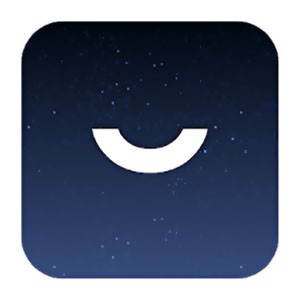
Pzizz is more than just a couple of hours of ambient sound. The developers have created a complete environment, balancing elements in a way that will make your eyelids wonder why they ever bothered to open in the first place.
What we like: We love the combination of ambient sound, music and more that creates an all-encompassing atmosphere of relaxation. Set it to play as long as you want. We like the free trial and that the premium version is about a buck a week.
Flaws: There is no free version.
2. Calm

Calm takes the meditative route to alleviate stress and send you off to dreamland. They include everything from breathing exercises to bedtime stories. It is also one of the few sleep apps that offers a worthwhile free version.
What we like: The variety of meditation exercises is impressive. The sleep stories are like an aural sedative. And if all else fails, they provide you with a variety of breathing exercises that should help melt away the stress.
Flaws: Does not always play nice with other apps, and it is relatively expensive.
3. Noisli
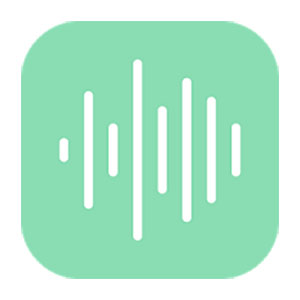
The Noisli mobile app is based on the company’s well-received web-based white noise application. Like its browser-based cousin, the mobile app lets you create your own sonic relaxation loops. Noisli is affordable, fun, and effective.
What we like: If you are the hands-on type, you will love Noisli. The ability to create your own ambient mix is a big plus. And there is a fade-out timer that scales back the volume, so you do not hear mixtapes in your dreams.
Flaws: Not a lot of consistency regarding which phones it will cooperate with and which ones it will have problems with.
4. Ten Percent Happier
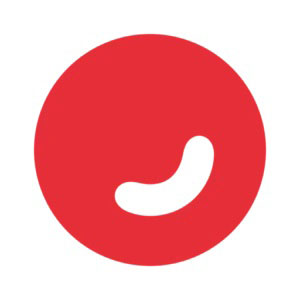
Ten Percent Happier is a meditation-based sleep app that has attracted a lot of fans. You may have difficulty determining if you are ten percent happier or just six or 7 percent happier. But you will probably sleep at least ten percent better if you use this app.
What we like: The app offers a wide variety of meditations ranging in length from three to 45 minutes. You can also engage the services of one of their meditation coaches.
Flaws: Fans of meditation tend to love it. Others not so much. The price will turn off some as well.
5. Slumber
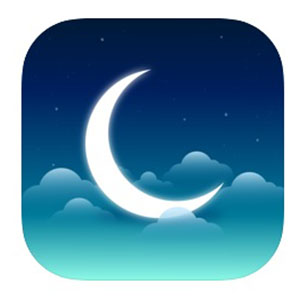
Some sleep apps offer one method of relaxation. Slumber offers three: meditation, ambient sound, and stories. They are constantly updating their content library, too. For a very modest price, you really get your money’s worth.
What we like: Slumber provides a choice of bedtime stories, ambient sound, and meditations. You can also combine them. So, for example, when a story ends, the sound of rainfall can take over and accompany you the rest of the night.
Flaws: iOS only.
6. Rain Rain
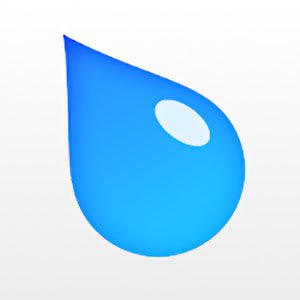
The sound of rain has been putting people to sleep since neolithic times. Rain Rain gathers up as many variations of the rain experience as its developers can find and offers them to you in one convenient app.
What we like: Maybe the best ambient sound only app on the market. If you love the sound of rain on the windowpane, or the gentle rumble of distant thunder, Rain Rain will be music to your ears.
Flaws: They tend to hound you for a rating.
7. Sleep Well Hypnosis
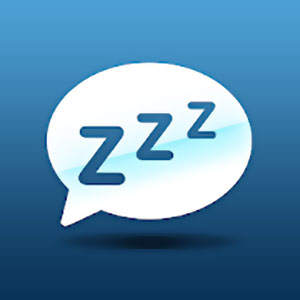
The Sleep Well Hypnosis method of putting you to sleep was designed by a certified hypnotherapist and provides carefully crafted meditations that help alleviate restlessness. You can use the limited free version or unlock additional features for a modest fee.
What we like: The meditations are accompanied by relaxing ambient noise. The binaural beats sync with your brainwaves to banish stressful energy. You can also control voice, background, and booster levels independently.
Flaws: The pay version features binaural beats that require the use of headphones. Be aware.
8. Sleepa
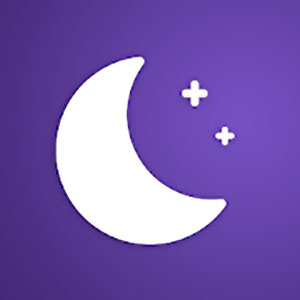
Sleepa is another classic ambient sound sleep app. But instead of focusing just on rain and its various manifestations, Sleepa also provides a variety of nature sounds, background city sounds, meditations, and more.
What we like: Sleepa provides 32 different ambient sounds, so you are not likely to get bored too quickly. They also offer one of the better free versions you will find. The app is also easy enough for anyone to use.
Flaws: The most recent iteration is pretty heavy on the ads.
9. Reflectly
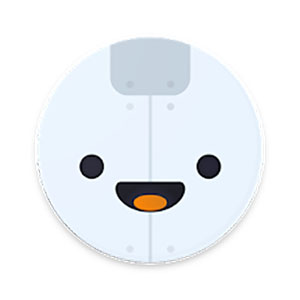
Reflectly is more than just a digital diary (although it is that too). It works by establishing a routine that signals your brain it is time to sleep. Restlessness is often a result of unresolved issues. Reflectly enables you to achieve resolution so you can relax.
What we like: The goal of Reflectly is to allow you to process those things that are causing stress and uncertainty so you can clear your mind for sleep time. It is not an approach that will work for everyone. But many should find it helpful.
Flaws: No truly free version. The number of things you can ‘reflect’ upon is also pretty limited.
10. Sleep Cycle

Sleep Cycle is designed to interact with sleep monitoring apps to help you better understand why you may be having a hard time sleeping, or why you wake up feeling tired. It is not a traditional sleep app, but many find its insights useful.
What we like: Those looking for a few hours of rain on the window will be disappointed. But for those who crave understanding, Sleep Cycle may be able to provide valuable insights that will eventually negate your need for a sleep app.
Flaws: Many of its most desirable features are only available in the premium version. So, how much is a good night’s sleep worth to you?
Who Needs A Sleep App?
Anyone having difficulty getting to sleep should consider using a sleep app. Whether your insomnia is the result of stress, illness, or any other cause, a sleep app should be able to help you drift off and get the sleep you need.
Older folks in particular often find sleep apps to be useful in helping them tame the insomnia that often comes with age. And shift workers, who live a life that runs contrary to their natural circadian rhythms also find sleep apps to be of enormous help.
But sleep apps are not just for the sleep-deprived. Many people who do not suffer any particular type of sleeplessness enjoy the restful atmosphere the sleep app creates. And many enjoy sharing sleep app stories with their partners and children.
How We Ranked
Sleep apps are commonly used by people who do not suffer from insomnia. But it cannot be forgotten that their primary purpose is to help those having trouble getting to sleep. So the process of ranking sleep apps must begin with that. That means not only testing the apps ourselves, but spending long hours sifting through user feedback to try and formulate a consensus.
After determining which are the best at putting you to sleep, we consider secondary characteristics. Do they offer some type of auto-shutoff, or do they simply play until you wake up in the morning? Do they bombard you with advertisements? Do they offer a variety of ambient sounds, stories, or music? Or are they a one-trick pony?
Finally, we consider cost. Is there a free version available? What features does the free version offer? If there is no free version, do they offer a free trial? How long is that free trial? Do you get to try the full version, or some stripped down version? And, ultimately, what is the cost of the app?
FAQs
Q: What is a sleep app?
A: A sleep app is a smartphone application that helps a person relax so they can get to sleep. You download them from Google Play or the App Store, install them on your phone and engage them when you lay down to sleep at night. While they are most often used by people having difficulty getting to sleep, there are plenty of other folks who use them just because they enjoy the sense of relaxation they create.
Q: How does a sleep app work?
A: There is nothing complicated or pseudo-scientific about sleep apps. A sleep app uses environmental sounds, ambient music, storytelling (1), or some similar mechanism to promote relaxation and restfulness. Many use the sound of rain falling or the rhythmic sound of waves crashing on the beach to generate a sense of tranquility. The user is then able to let go of their cares and drift off to sleep.
Q: Do sleep apps actually work?
A: Clinical studies into the matter are lacking. So it is difficult to state with any scientific certainty that sleep apps work as promised. That said, many people swear by them and state they could not get to sleep without them. So that has to count for something. At the end of the day, only you can determine if a sleep app will work for you or not. And since many offer a free trial period, you really have nothing to lose.
Q: How do I know which sleep app is right for me?
A: It may take some time to determine which sleep app works best for you. Fortunately, most sleep apps are either free, or will let you try them free of charge for a limited time, typically a week or two. So you have nothing to lose. Try downloading a few and see which one works.
Q: Are sleep apps the same as sleep tracking apps?
A: No, they are not the same as sleep tracking apps. A sleep tracking app purports to monitor your brain activity while you sleep. The idea is that this information will enable you to learn something about your sleep cycle, although what you are supposed to do with the information is the subject of some debate (2). A sleep app, like the ones listed above, simply helps you drift off to slumberland so you wake up refreshed.
Q: Will the sleep app work better with the air conditioning on?
A: It may. Most experts agree that a room temperature of about 65 Fahrenheit is ideal for getting to sleep. Because the human body naturally cools down during sleep (3), it is thought the cool room temperature triggers that association and helps you drift off faster and stay asleep all night. So it is very likely that the combination of a cool room and a sleep app will help you get the sleep you need.
Q: Why do I have to pay for a sleep app when other apps are free?
A: First of all, there are some free sleep apps out there, and others will allow you a free trial period so you can test drive them. But think about it: the goal of the sleep app is to put you to sleep. If it works, you will not be awake for most of the time it is engaged. This makes it very difficult for developers to monetize their app, since you will not be making in-app purchases, watching ads, or clicking through to affiliate sites while you sleep.
Q: Do sleep apps play all night while I sleep?
A: Some sleep apps will play for a set amount of time. For instance, as long as it takes to tell the story. Some are programmed to gradually reduce in volume as they play, eventually going silent after X amount of time. And some will still be playing when you wake up in the morning.
Q: Will it help if I eat a big meal before sleeping?
A: While there is evidence that eating before sleeping can help send some people off to dreamland, it is not a healthy strategy. Eating a big meal right before bedtime can lead to indigestion, reflux, weight gain, nightmares, and type 2 diabetes (4). You may, however, find it helpful to have a snack before turning in. Those that contain complex carbs and perhaps a dairy element may help the sleep app do its thing more effectively.
Q: Why do I have a hard time falling asleep after exercising?
A: Health professionals have long said that vigorous exercise can help you sleep better. Yet some people have difficulty falling asleep after exercise. Why is that? In most cases, the cause is exercising too close to bedtime. When you exercise, your body produces adrenaline. If you exercise within an hour or so of going to bed, it is likely adrenaline will still be coursing through your system and will prevent you from getting to sleep.
Q: What are some signs that a person is not getting enough sleep?
A: People who are not getting enough sleep are typically moody and irritable. They also tend to be impatient. And they may lack normal emotional responses. Most will have difficulty solving problems and will be indecisive. Microsleep episodes are another sure sign that a person is not getting enough sleep.
Q: Can health problems cause sleeplessness?
A: There are quite a few health problems that have the potential to interfere with your ability to get to sleep. Arthritis, and the pain and stiffness that comes with it, is one. Back pain, depression, and anxiety can also prevent you from falling asleep when you should. A sleep app can help take your mind off whatever might be bothering you so you can get to sleep easier.
Q: Will a few drinks help the sleep app work better?
A: There is no doubt alcohol is a sedative. But there is a price to pay for drinking before bedtime. Studies show that people who drink before going to bed experience less REM sleep (5). In other words, they may well be unconscious, but they are not necessarily sleeping. Dreaming occurs during REM sleep and is an essential component of memory consolidation. Without this, our thoughts and feelings become fragmented and confused.
Q: What should I do if my sleep app does not work?
A: If a particular sleep app is not helping you fall asleep, you should try another one. There are so many out there today that the chances are good you will be able to find one that works for you. Keep in mind too that there might be other factors preventing the sleep app from working. For instance, if you drank coffee during the evening, it can easily interfere with your ability to get to sleep.
Related Articles
Recap
A sleep app can help those who lie awake in bed at night finally get the restful sleep they need. Whatever the cause of your sleeplessness – illness, stress, shift work, or anything else – a sleep app can create a relaxing atmosphere that enables you to transcend the source of your insomnia.
Sleep apps tend to fall into three general categories: ambient sound, ambient music, and storytelling. Within each category there are myriad choices that will appeal to different people. So the chances of finding an app that will help you are excellent. Many sleep apps are free or offer free trials. So you have nothing to lose by comparison shopping until you find the right one.
For cpoe.org’s #1 recommended sleep app, click here.

